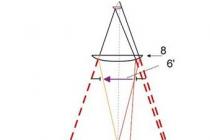As the main state guarantees for wages, Art. 130 of the Labor Code of the Russian Federation highlights:
The value of the minimum wage (SMIC).
The minimum wage is set simultaneously throughout the territory Russian Federation federal law. According to Art. 133 of the Labor Code of the Russian Federation, the minimum wage cannot be lower than the value living wage able-bodied population, however, this norm has not yet been implemented, since it requires the adoption of a special federal law (Article 421 of the Labor Code of the Russian Federation). The increase in the minimum wage is carried out systematically on the basis of federal laws on amendments to the federal law dated June 19, 2000 No. 82-FZ “On minimum size wages".
Labor Code of the Russian Federation in Art. 133.1 allows for the possibility of establishing a guarantee of a larger wage compared to the minimum wage at the level of constituent entities of the Russian Federation. This value is called the minimum. salary and is set by a regional minimum wage agreement. The size of the minimum wage is set taking into account the socio-economic conditions and the subsistence level of the able-bodied population in the relevant subject of the Russian Federation and should not be lower than the minimum wage.
The amount of the minimum wage in a constituent entity of the Russian Federation applies to employees working in the territory of the corresponding constituent entity of the Russian Federation. Ensuring the payment of wages, taking into account the minimum wage guarantee, is carried out, depending on the category of the employer, at the expense of the budget of the constituent entities of the Russian Federation, local budgets, extra-budgetary funds, as well as funds received from entrepreneurial and other income-generating activities. Taking into account the indicated sources of financing, an exemption from the minimum wage guarantee has been established for employees of organizations financed from federal budget.
Measures to increase the level of the real content of wages.
As such a measure, Art. 134 of the Labor Code of the Russian Federation calls the indexation (increase) of wages in connection with the growth of consumer prices for goods and services. Its indexation procedure depends on whether the employer is a state body, a local government, state or municipal institution: if it is, then for it the procedure for indexing wages is determined by regulatory legal acts if not, then by a collective agreement, agreements, local regulations.
Indexation of wages, as indicated in the ruling of November 19, 2015 No. 2618-0 of the Constitutional Court of the Russian Federation, should be provided to all persons working under an employment contract.
Establishment of restrictions on the list of grounds and amounts of deductions from wages at the initiative of the employer.
Withholding from wages is made only in cases provided for by the Labor Code of the Russian Federation itself and other federal laws. Labor Code of the Russian Federation in Art. 137 provides as grounds for deduction from wages:
- - reimbursement of the unworked advance payment issued to the employee on account of wages;
- - repayment of an unspent and not returned in a timely manner advance payment issued in connection with a business trip or transfer to another job in another area, as well as in other cases;
- - refund of amounts overpaid to the employee due to accounting errors, as well as amounts overpaid to the employee, in case of recognition by the body for consideration of individual labor disputes fault of the employee in non-compliance with labor standards or downtime;
- - dismissal (except for dismissals under paragraph 8 of part 1 of article 77, paragraphs 1-2, 4 of part 1 of article 81, paragraphs 1-2.5-7 of article 83 of the Labor Code of the Russian Federation) of an employee before the end of that work of the year in which he has already received annual paid leave, for unworked vacation days.
In the first three cases, the employer's decision to withhold is limited to a month from the date of expiration of the period for the return of the advance, repayment of debts or incorrectly calculated payments. The condition for making such a decision is the absence of objections from the employee. Upon dismissal, deduction is made within the framework of Art. 140 Labor Code of the Russian Federation final settlement with an employee.
But general rule provided for in Art. 138 of the Labor Code of the Russian Federation, all deductions from wages cannot exceed 20% of the accrued wages. This limit is applicable for cases of deductions provided for in Art. 137 of the Labor Code of the Russian Federation, as well as for cases of bringing to liability in administrative procedure by order (instruction) of the employer.
If the reason for the withholding is a decision government agencies or an indication of the law, the amount of deductions may be increased. So, in cases specifically provided for by federal laws, up to 50% of an employee's salary can be withheld (for example, when deducted under several executive documents).
The above restrictions on the amount of deductions from wages do not apply to deductions from wages when serving corrective labor, collecting alimony for minor children, compensating for harm caused to the health of another person, compensating for harm to persons who have suffered damage due to the death of the breadwinner, and compensating for damages. caused by the crime. The amount of deductions from wages in these cases cannot exceed 70%.
Withholding from payments that are not foreclosed in accordance with federal laws is not allowed. So, according to Art. 101 of the Federal Law of October 2, 2007 No. 229-FZ “On Enforcement Proceedings”, it is impossible to deduct from compensation payments established by labor legislation.
Limitation of wages in kind.
As a general rule, according to Art. 131 of the Labor Code of the Russian Federation is the payment of wages in cash in the currency of the Russian Federation 1 . Payment can be made in cash or in a non-cash form. As a rule, wages are paid in cash. Non-cash form is possible only on the conditions stipulated by the collective or labor agreement and only on the initiative or with the consent of the employee.
Also, as an exceptional rule, Art. 131 of the Labor Code of the Russian Federation allows the payment of wages in non-monetary form. Taking into account the provisions of the ILO Convention No. 95 Regarding the Protection of Wages (1949), the requirements of Art. 131 of the Labor Code of the Russian Federation, clarifications given by the Plenum of the Supreme Court of the Russian Federation in Resolution No. 2 of March 17, 2004, the following can be distinguished as conditions for the legitimacy of a non-monetary form of wages:
- - the possibility of paying wages in non-monetary form is provided for by the collective and (or) labor contract;
- - the basis for the payment of wages in non-monetary form to a particular employee is his will, confirmed by a written statement. Such consent may be expressed in relation to a particular payment, and may extend to a period of time until the employee withdraws his consent;
- - non-monetary form of payment of wages should not exceed 20% of the monthly salary accrued to the employee;
- - payment of wages in non-monetary form is made by products that are not related to the number of items withdrawn from circulation, limited in circulation, to the number of conventional monetary units;
- - payment of wages in kind is common or desirable in these industries, types of economic activity or professions (for example, the payment of wages in agricultural products);
- - the payment of wages in kind is suitable for the personal consumption of the worker and his family or brings him some kind of benefit;
- - when paying wages to an employee in non-monetary form, the requirements of reasonableness and fairness in relation to the cost of goods transferred to him as wages are met, i.e. their value, in any case, must not exceed the level market prices prevailing for these goods in a given area during the period of accrual of payments.
Failure to comply with at least one of the indicated conditions entails the recognition of unlawful payment of wages in non-monetary form.
Ensuring that the employee receives wages in the event of termination of the employer's activity and its insolvency in accordance with federal laws.
According to Art. 64 of the Civil Code of the Russian Federation, in the event of liquidation of an organization, claims for the payment of severance pay and remuneration of persons who worked or are working under an employment contract are satisfied as part of the second priority.
Federal state supervision for compliance labor law and other normative legal acts containing labor law norms, including conducting inspections of the completeness and timeliness of payment of wages and the implementation of state guarantees for wages. The subjects of this supervision are the Federal Labor Inspectorate, the prosecutor's office, federal and regional authorities within the framework of intradepartmental control in their subordinate organizations.
Responsibility of employers for violation of the requirements established by labor legislation and other regulatory legal acts containing labor law norms, collective agreements, agreements.
There are several types of such responsibility (Table 9.2):
Terms and order of payment of wages.
General rules for determining the timing of payment of wages are defined in Art. 136 of the Labor Code of the Russian Federation. At the same time, the minimum number of wage payments per month is currently determined: there must be at least two such payments. In addition, the normative procedure defines the frequency of payments: they must fall on each half of the month and follow no later than 15 days from the end of the period for which these payments are made. According to the explanation given in the letter of the Ministry of Labor of the Russian Federation dated February 14, 2017 No. 14-1 / OOG-1293, indicated in Art. 136 of the Labor Code of the Russian Federation, the rule on determining the timing of payment of wages does not apply to bonuses and other incentive payments established for the results of work, the achievement of relevant indicators. The Ministry of Labor of Russia recommended that employers determine the terms for paying employees the specified elements of wages independently by a collective agreement, a local regulatory act. However, at present, Art. 136 of the Labor Code of the Russian Federation does not provide for regulatory grounds for such local regulation.
Types of liability for violation of legislation on remuneration
Table 9.2
|
Type of responsibility |
|
|
Material responsibility |
If the employer violates the established deadline for paying wages, the employer is obliged to pay it with interest ( monetary compensation) in the amount of not less than one hundred and fiftieth of the key rate in force at that time Central Bank RF from the amounts not paid on time for each day of delay starting from the next day after the due date of payment up to the day of actual settlement inclusive. The amount of such compensation may be increased by a collective agreement, a local regulation or an employment contract (Article 236 of the Labor Code of the Russian Federation). The employee may also claim compensation. moral damage(Article 237 of the Labor Code of the Russian Federation). |
|
Administrative responsibility |
Non-payment or incomplete payment within the established period of wages, other payments made within the framework of labor relations if these actions do not contain a criminally punishable act, or the establishment of wages in an amount less than the amount provided for by labor legislation entails bringing to administrative responsibility (part 6 of article 5.27 of the Code of Administrative Offenses of the Russian Federation) |
|
Criminal responsibility |
Partial non-payment of more than three months of wages, pensions, scholarships, allowances and other statutory payments made out of selfish or other personal interest by the head of the organization, the employer - individual, the head of a branch, representative office or other separate structural unit organizations (part 1 of article 145.1 of the Criminal Code of the Russian Federation), as well as complete non-payment of these amounts for more than two months (part 2 of article 145.1 of the Criminal Code of the Russian Federation) entails criminal liability |
|
Disciplinary responsibility |
An employee responsible for the establishment and (or) payment of wages, who has committed a disciplinary offense that resulted in a violation in the field of wages, may be held by the employer to disciplinary liability. In addition, at the request of the representative body of employees about the violation by the head of the organization, the head of the structural unit of the organization, their deputies of regulatory legal acts, the collective agreement, the agreement, including in terms of the provisions on remuneration, upon confirmation of the facts of such violations, the employer is obliged to apply to these employees disciplinary action up to dismissal (Article 195 of the Labor Code of the Russian Federation). |
Specific dates for the payment of wages should be determined by the rules of internal work schedule, collective agreement or labor contract.
Labor Code, N 197-FZ | Art. 130 of the Labor Code of the Russian Federation
Article 130 of the Labor Code of the Russian Federation. Basic state guarantees for the remuneration of employees (current version)
The system of basic state guarantees for the remuneration of workers includes:
the value of the minimum wage in the Russian Federation;
paragraph is invalid. - Federal Law of August 22, 2004 N 122-FZ;
measures to ensure an increase in the level of the real content of wages;
limiting the list of grounds and amounts of deductions from wages by order of the employer, as well as the amount of taxation of income from wages;
limitation of wages in kind;
ensuring that the employee receives wages in the event of termination of the employer's activities and its insolvency in accordance with federal laws;
federal state supervision over compliance with labor legislation and other regulatory legal acts containing labor law norms, including conducting checks on the completeness and timeliness of payment of wages and the implementation of state guarantees for wages;
responsibility of employers for violation of the requirements established by labor legislation and other regulatory legal acts containing labor law norms, collective agreements, agreements;
terms and order of payment of wages.
- BB code
- Text
Document URL [copy ]
Commentary on Art. 130 of the Labor Code of the Russian Federation
1. One of the main guarantees is the value of the minimum wage. The minimum wage performs two functions: it protects workers from unreasonably low wages and is the base value for compiling tariff scales and salary schemes.
2. The system of state guarantees for the remuneration of workers includes measures that ensure an increase in the level of the real content of wages. The main (and so far the only) such measure is the indexation of wages in connection with the growth of consumer prices for goods and services (see comments to Article 134).
3. The guarantee for the employee to receive wages in full is the limitation of deductions from the employee's wages. The Labor Code limits both the grounds for deductions and their size (see comments to Articles 137, 138).
4. The next guarantee for the remuneration of workers, classified as state, is the limitation of remuneration in kind (see commentary to Art. 131).
5. Among the guarantees is also the provision for the employee to receive wages in the event of termination of the employer's activities and its insolvency.
In accordance with paragraph 1 of Art. 64 of the Civil Code of the Russian Federation upon liquidation legal entity settlements for the payment of severance pay and wages are made in the second place after claims for payments for causing harm to life and health. A similar rule applies to individual entrepreneur(Article 134 of the Bankruptcy Law).
Declaring an employer bankrupt is considered by the legislator as a basis for providing employees with special guarantees that ensure the implementation of their labor rights, incl. the right to timely and full payment of wages. Article 2 of the Bankruptcy Law recognizes the employees of the organization as creditors in terms of the demand for payment of severance pay and wages. The legal status of employees in the event that the employer is declared bankrupt is characterized by the presence of certain advantages over other creditors. In particular, the moratorium (Article 95 of the Bankruptcy Law) does not apply to the satisfaction of claims for the recovery of wage arrears.
In case of insufficiency Money on the account of the employer, in order to satisfy the claims made against him, first of all, write-offs are carried out according to executive documents providing for the transfer or issuance of funds to satisfy claims for compensation for harm caused to life and health, as well as claims for the recovery of alimony; in the second place, claims for the payment of severance pay and wages with persons working under an employment contract are satisfied, if these requirements are confirmed by executive documents (certificate of the KTS, writ of execution); in the third place, write-offs are made according to payment documents providing for the transfer or issuance of funds for settlements on wages with persons working under an employment contract (clause 2, article 855 of the Civil Code of the Russian Federation). This rule applies subject to the provisions of Art. 5 of the Federal Law of 03.12.2012 N 216-FZ "On the federal budget for 2013 and for the planning period of 2014 and 2015", i.e. write-offs of funds under settlement documents providing for payments to the budgets of the budget system of the Russian Federation, as well as the transfer or issuance of funds for settlements of wages with persons working under an employment contract, are made in the order of the calendar order of receipt of these documents after the transfer of payments made in accordance with from Art. 855 of the Civil Code of the Russian Federation in the first and second stages.
6. Among the state guarantees for the remuneration of workers, federal state supervision of compliance with labor legislation and other regulatory legal acts containing labor law norms, including the conduct of inspections of the completeness and timeliness of payment of wages and the implementation of state guarantees for remuneration and the responsibility of employers, are also named. for violation of the requirements established by the Labor Code, laws, other regulatory legal acts, collective agreements, agreements. These guarantees are general character and are important in the application of not only legal norms on remuneration, but also the norms of other institutions of labor law (see art. 353 - 369 of the Labor Code).
7. With regard to wages, the main violation of employers is the delay in payment of wages. This violation entails adverse consequences for both the employer and his officials. Firstly, the employer pays compensation for each day of delay in payment of wages (see comments to Article 236). Secondly, managers and other officials of organizations guilty of delaying the payment of wages can be brought to disciplinary (Articles 195, 362, 419 of the Labor Code), administrative (Article 5.27 of the Code of Administrative Offenses of the Russian Federation) and criminal (Article 145.1 of the Criminal Code of the Russian Federation) responsibility. Thirdly, an employee can resort to self-defense of his right to receive wages in a timely manner and in full (see comments to Article 142 of the Labor Code), i.e. pause execution job duties until the employer fulfills its obligations.
Other violations of legislation on remuneration, for example, non-payment of bonuses established by the remuneration system, payment overtime work in a single amount, payment of wages in full in kind, etc., may entail administrative liability of the employer and (or) its officials (Article 5.27 of the Code of Administrative Offenses of the Russian Federation). If the requirements of a collective agreement or agreement are violated, for example, on the establishment of an additional payment of a certain amount for night work, the employer or the person representing him may be held administratively liable under Art. 5.31 of the Code of Administrative Offenses of the Russian Federation.
Indeed, from a systematic interpretation of the provisions of Art. 130, 164, 165, 287 Labor Code The Russian Federation does not follow that incentive payments as part of wages are an element of the system of basic state guarantees for the remuneration of workers, guarantees and compensations to persons working part-time ...
The Labor Code of the Russian Federation in Article 130 defines the main state guarantees for the remuneration of employees, including the amount of the minimum wage in the Russian Federation, and Article 133 provides that the minimum wage is established simultaneously throughout the Russian Federation by federal law and cannot be lower the subsistence minimum for the able-bodied population ...
The system of basic state guarantees for the remuneration of workers includes (Article 130 of the Labor Code of the Russian Federation):
- the value of the minimum wage in the Russian Federation;
- measures to ensure an increase in the level of the real content of wages;
- limiting the list of grounds and amounts of deductions from wages by order of the employer, as well as the amount of taxation of income from wages;
- limitation of wages in kind;
- ensuring that the employee receives wages in the event of termination of activities and his insolvency in accordance with federal laws;
- state supervision and control over the full and timely payment of wages and the implementation of state guarantees for wages;
- responsibility of employers for violation of the requirements established by labor legislation and other regulatory legal acts containing labor law norms, collective agreements, agreements;
- terms and order of payment of wages.
The system of state guarantees for wages includes measures that ensure an increase in the level of the real content of wages. The main (and so far the only) such measure is the indexation of wages in connection with the growth of consumer prices for goods and services.
The guarantee that the employee receives wages in full is the limitation of deductions from the employee's wages. The Labor Code limits both the grounds for deductions and their size (Articles 137, 138 of the Labor Code of the Russian Federation).
Wages are paid in cash in the currency of the Russian Federation (in rubles).
In accordance with or upon a written application of the employee, remuneration may also be made in other forms that do not contradict the legislation of the Russian Federation and international treaties of the Russian Federation. The share of wages paid in non-monetary form cannot exceed 20 percent of the accrued monthly wage (Article 131 of the Labor Code of the Russian Federation).
Payment of wages in bonds, coupons, in the form of debt obligations, receipts, as well as in the form of alcoholic beverages, narcotic, poisonous, harmful and other toxic substances, weapons, ammunition and other items in respect of which prohibitions or restrictions on their free circulation are established , not allowed.
The minimum wage (minimum wage) is established throughout the territory of the Russian Federation by federal law and is one of the main state guarantees for wages (Article 130 of the Labor Code of the Russian Federation). Currently, the Federal Law of June 19, 2000 N 82-FZ “On the minimum wage” is in force. According to Art. 3 of this Law, the minimum wage is used to regulate wages, as well as to determine the amount of benefits for temporary disability. From January 1, 2009, it is 4330 rubles. This means that the salary of an employee who has fully worked out the monthly norm of working hours or fulfilled labor standards, taking into account all additional payments, allowances, incentive and compensation payments, including northern allowances and regional coefficients, cannot be lower than the specified size or regional minimum wage if it is installed in the subject of the Russian Federation.
What are the forms and systems of remuneration of personnel: Video
Basic state guarantees for wages workers. The minimum wage.
The system of basic state guarantees for the remuneration of workers includes (Article 130 of the Labor Code of the Russian Federation):
— the value of the minimum wage in the Russian Federation;
- Measures to ensure an increase in the level of the real content of wages;
- limiting the list of grounds and amounts of deductions from wages by order of the employer, as well as the amount of taxation of income from wages;
— limiting wages in kind;
- ensuring that the employee receives wages in the event of termination of the employer's activities and its insolvency in accordance with federal laws;
- state supervision and control over the full and timely payment of wages and the implementation of state guarantees for wages;
- the responsibility of employers for violation of the requirements established by labor legislation and other regulatory legal acts containing labor law norms, collective agreements, agreements;
- timing and sequence of payment of wages.
The system of state guarantees for the remuneration of workers includes measures that ensure an increase in the level of the real content of wages. The main (and so far the only) such measure is the indexation of wages in connection with the growth of consumer prices for goods and services.
The guarantee that the employee receives wages in full is the limitation of deductions from the employee's wages. The Labor Code limits both the grounds for deductions and their size (Articles 137, 138 of the Labor Code of the Russian Federation).
Wages are paid in cash in the currency of the Russian Federation (in rubles).
In accordance with a collective agreement or an employment contract, upon a written application of an employee, remuneration may also be made in other forms that do not contradict the legislation of the Russian Federation and international treaties of the Russian Federation. The share of wages paid in non-monetary form cannot exceed 20 percent of the accrued monthly wage (Article 131 of the Labor Code of the Russian Federation).
Payment of wages in bonds, coupons, in the form of debt obligations, receipts, as well as in the form of alcoholic beverages, narcotic, poisonous, harmful and other toxic substances, weapons, ammunition and other items in respect of which prohibitions or restrictions on their free circulation are established , not allowed.
The minimum wage (minimum wage) is established throughout the territory of the Russian Federation by federal law and is one of the main state guarantees for wages (Article 130 of the Labor Code of the Russian Federation). Currently, the Federal Law of June 19, 2000 N 82-FZ “On the minimum wage” is in force. According to Art. 3 of this Law, the minimum wage is used to regulate wages, as well as to determine the amount of benefits for temporary disability. From January 1, 2009, it is 4330 rubles. This means that the salary of an employee who has fully worked out the monthly norm of working hours or fulfilled labor standards, taking into account all additional payments, allowances, incentive and compensation payments, including northern allowances and regional coefficients, cannot be lower than the specified size or regional minimum wage if it is installed in the subject of the Russian Federation.
New edition Art. 130 of the Labor Code of the Russian Federation
The system of basic state guarantees for the remuneration of workers includes:
the value of the minimum wage in the Russian Federation;
measures to ensure an increase in the level of the real content of wages;
limiting the list of grounds and amounts of deductions from wages by order of the employer, as well as the amount of taxation of income from wages;
limitation of wages in kind;
ensuring that the employee receives wages in the event of termination of the employer's activities and its insolvency in accordance with federal laws;
federal state supervision over compliance with labor legislation and other regulatory legal acts containing labor law norms, including conducting checks on the completeness and timeliness of payment of wages and the implementation of state guarantees for wages;
responsibility of employers for violation of the requirements established by labor legislation and other regulatory legal acts containing labor law norms, collective agreements, agreements;
terms and order of payment of wages.
Commentary on Article 130 of the Labor Code of the Russian Federation
The system of basic state wage guarantees includes, in particular:
1) the prohibition of discrimination in the establishment and change of wages and other conditions of remuneration (part 3 of article 37 of the Constitution of the Russian Federation, part 2 of article 132 of the Labor Code of the Russian Federation);
2) the establishment of the minimum wage, as well as the value of the minimum wage tariff rate public sector employees;
3) measures to ensure an increase in the level of the real content of wages;
4) limiting the list of grounds and amounts of deductions from wages by order of the employer;
5) limitation of wages in kind;
6) ensuring that the employee receives wages in the event of termination of the employer's activity and its insolvency;
7) establishment of terms and procedure for payment of wages;
8) special measures for the protection of wages in the event of the insolvency of the employer and the termination of his activities;
9) state supervision and control over the full and timely payment of wages and the implementation of state guarantees for wages;
10) establishment of measures of responsibility of the employer for violation of the rights of employees in the field of remuneration.
Consider the implementation of the most important guarantees in the field of wages.
Prohibition of discrimination in the world of work
This prohibition is so important for any state that it is recorded in the Universal Declaration of Human Rights, approved and proclaimed by the UN General Assembly on December 10, 1948, article 23 of which states: every person, without any discrimination, has the right to equal pay for equal work (point 2). The International Covenant on Economic, Social and Cultural Rights, approved by the UN General Assembly in 1966, affirmed the right of everyone to remuneration that ensures at least all workers "fair wages and equal remuneration for work of equal value, without distinction of any kind, and in particular, women must be guaranteed working conditions no worse than those enjoyed by men, with equal pay for equal work” (Article 7 (a)).
In Russian legislation, the prohibition of wage discrimination is set out in articles 3 and 132 of the Labor Code of the Russian Federation.
Minimum wage
First of all, according to Article 37 of the Constitution of the Russian Federation, everyone is guaranteed the right to remuneration for work without any discrimination and not lower than the minimum wage established by federal law. Thus, the minimum wage in the Russian Federation is the lowest limit of wages for employees and is established by federal law. The minimum wage is the lowest wage limit for employees, which does not include additional payments and allowances, as well as bonuses and other incentive payments.
The minimum wage established by federal law is ensured by:
Organizations financed from the federal budget - at the expense of the federal budget;
Organizations financed from the budgets of the constituent entities of the Russian Federation - at the expense of the budgets of the constituent entities of the Russian Federation;
Organizations financed from local budgets - at the expense of local budgets;
other employers - at their own expense.
The monthly salary of an employee who has worked the norm of working hours for this period and fulfilled the norms of labor (labor duties) cannot be lower than the minimum wage.
The sizes of tariff rates, salaries (official salaries), as well as basic salaries (basic official salaries), basic wage rates for professional skill groups employees cannot be below the minimum wage.
The determination by the state or participants of social partnership procedures of the minimum wage pursues several socio-economic goals at once. First, it guarantees a minimum the necessary conditions for reproduction work force, social development personalities of workers and their families. Secondly, it contributes to the operation of the principle of social justice, and consequently, social stability in society. Thirdly, it provides, although indirect, but very effective regulation of the level of employment (in particular, excessively low wage rates reduce the supply of labor, and excessively high ones reduce the demand for it). Fourth, it improves the functioning of primary (commodity) markets and increases the efficiency of social production.
In the sense of the Basic Law of the Russian Federation, the minimum wage is social guarantee in the area of wages. At the same time, this initial constitutional meaning of the normative fixing of the minimum wage has been largely deformed by the current legislation. In almost all branches of law, the minimum wage began to perform the functions of a measuring instrument, a calculation standard of the most diverse values: scholarships, pensions, allowances and other social payments, fines, etc., which are completely uncharacteristic of it. According to some estimates, the minimum wage served as an estimated figure in more than 150 normative documents at the federal level. The reasons that prompted the legislator to accept the minimum wage as a calculation standard are quite understandable: the establishment of certain values in a specific monetary amount was inappropriate due to high inflation rates. However, the minimum wage itself, in this capacity, turned out to be subject to inflation to no lesser extent. An increase in the minimum wage automatically led to a proportional increase in all values \u200b\u200blinked to it (primarily various kinds of social payments). This, in turn, led to the fact that for about three years (from 1997 to 2000) the minimum wage did not change. Such a devaluation of the minimum wage is fraught with the possibility of a serious crisis in the entire wage system and, above all, in the public sector, where the size of tariff rates directly depends on the statutory minimum wage.
The way out of this crisis situation could only be found by eliminating the calculated function of the minimum wage, which was undertaken in 2000. In accordance with Article 1 of the Federal Law of June 19, 2000 N 82-FZ "On the minimum wage" from July 1, 2000, the minimum wage is applied only in the following cases:
To regulate wages;
To determine the amount of benefits for temporary disability;
For payments in compensation for harm caused by injury, occupational disease or other damage to health associated with the performance of labor duties.
In other cases, instead of the minimum wage, a new calculation indicator was introduced - the "base amount", which was set at 100 rubles. Federal Law No. 122-FZ of August 7, 2000 "On the Procedure for Establishing the Amounts of Scholarships and Social Payments in the Russian Federation" amended the legislation in terms of calculating the amount of scholarships and social payments. At the same time, it was immediately possible to achieve an increase in the minimum wage guaranteed by the state. Of course, such an approach of the legislator could not but cause a significant reduction in the size of scholarships and social payments, as well as their prospective “lag” behind the minimum wage. However, we would like to note that the problem of increasing the size of scholarships and allowances will not be resolved by itself if we return to the practice of calculating them based on the minimum wage.
Currently, Article 133 of the Labor Code of the Russian Federation establishes that the minimum wage cannot be lower than the subsistence minimum for the able-bodied population.
Today, the subsistence minimum is much higher than the minimum wage. At the same time, a phased increase in the minimum wage (SMIC) and its gradual approach to the subsistence minimum are expected. So, according to the Federal Law "On the minimum wage" of June 19, 2000 N 82-FZ, the minimum wage is set at 1,100 rubles. per month.
Wage indexation
The measures that ensure an increase in the level of the real content of wages, first of all, include the indexation of wages, i.e. compensation in order to ensure cash income (including wages), as well as savings of citizens, in connection with the increase in prices.
Wages (and other incomes) are indexed when the consumer price index exceeds the so-called consumer price indexation threshold.
Organizations financed from the relevant budgets index wages in the manner prescribed by labor legislation and other regulatory legal acts containing labor law norms, other employers - in the manner established by the collective agreement, agreements, local regulations.
For persons residing in regions and localities where regional wage coefficients are applied in accordance with the established procedure, the amount of the minimum wage subject to indexation is determined taking into account these coefficients. Currently, indexation of salaries in the public sector is carried out by revising the level of the minimum wage and the corresponding increase in the value of the tariff rate of the 1st category of the ETC.
"Legal" payroll
Wage must be paid at least every six months. For certain categories employees, legislation may establish other terms for its payment. It must be said that wages can be paid in the form of an advance payment and actual wages. However, in this case, the amount of such an advance cannot be lower than the wage for the time actually worked.
If the day of payment coincides with a weekend or non-working holiday, payment of wages is made on the eve of this day. Holidays are paid no later than three days before the start of the holiday.
Article 236 of the Labor Code of the Russian Federation establishes the responsibility of the employer for the delay in the payment of wages ( material liability). In particular, if the employer violates the established deadline for paying wages, vacation pay, dismissal payments and other payments due to the employee, the employer is obliged to pay them with interest (monetary compensation) in the amount of at least one three hundredth of the refinancing rate of the Central Bank of the Russian Federation for each day delays. Plenum Supreme Court The Russian Federation explained that if a collective agreement or an employment contract defines a different amount of interest payable by the employer due to delayed payment of wages, the court calculates the amount of monetary compensation taking into account this amount, provided that it is not lower than that established by Article 236 of the Labor Code of the Russian Federation. At the same time, the accrual of interest due to late payment of wages does not exclude the right of the employee to index the amounts of delayed wages due to inflation (Resolution of the Plenum of the Supreme Court of the Russian Federation "On the application by the courts of the Russian Federation of the Labor Code of the Russian Federation" dated March 17, 2004 N 2 ).
In addition, the Labor Code of the Russian Federation provided that an employee has the right to stop working (by notifying the employer about this) if the delay in wages was more than 15 days (self-defense by the employee of his labor rights). At the same time, it should be taken into account that the suspension of work is allowed not only in the case when the delay in payment of wages for a period of more than 15 days occurred due to the fault of the employer, but also in the absence of such.
Suspension of work is not allowed:
during periods of introduction of martial law, a state of emergency or special measures in accordance with the legislation on a state of emergency;
in the bodies and organizations of the Armed Forces of the Russian Federation, other military, paramilitary and other formations and organizations in charge of ensuring the defense of the country and state security, emergency rescue, search and rescue, fire fighting, work to prevent or eliminate natural disasters and emergency situations, in law enforcement agencies;
civil servants;
in organizations directly serving especially dangerous types of production, equipment;
employees whose labor duties include the performance of work directly related to ensuring the life of the population (energy supply, heating and heat supply, water supply, gas supply, communications, ambulance and emergency medical care stations).
In accordance with Article 142 of the Labor Code of the Russian Federation, during the period of suspension of work, the employee has the right to work time be absent from work. In addition, by direct indication of Article 4 of the Labor Code of the Russian Federation, the requirement to perform work in case of non-payment of wages refers to forced labor, so the employee has the right not to go to work until the delayed amount is paid to him. An employee who was absent during his working hours at the workplace during the period of suspension of work is obliged to return to work no later than the next working day after receiving a written notice from the employer about the readiness to pay the delayed wages on the day the employee goes to work.
In any case, the employee is obliged to bring to the attention of the employer or his representative his intention to use self-defense in writing otherwise, his actions may be regarded as a violation of labor discipline.
The Labor Code of the Russian Federation contains a ban on the employer and his representatives to prevent the implementation of self-defense by the employee.
At the time of refusal to work, the employee retains all the rights provided for by the Labor Code of the Russian Federation, other laws and other regulatory legal acts. This means, in particular, that the employer is obliged to pay the employee for the time of his forced downtime.
It is important to note that the use of self-defence measures by workers in case of non-payment of wages to them is not a strike and can be used, among other things, by those categories of workers whose right to strike is limited by law.
The current legislation regulates the procedure for payment of wages. So, according to the payment of wages, the employer is obliged to issue a payslip to the employee, which must indicate the components of wages, the amount and grounds for deductions from wages, as well as the total amount of money to be paid. The form of the payslip is approved by the employer, taking into account the opinion of the representative body of employees, in the manner prescribed by Article 372 of the Labor Code of the Russian Federation for the adoption of local regulations.
Wages are paid directly to the employee, unless another method of payment is provided for by federal law or an employment contract.
Wages are paid to the employee, as a rule, at the place of work or transferred to the bank account specified by the employee. The place and terms of payment of wages in non-monetary form are determined by a collective agreement or an employment contract.
Upon termination employment contract payment of all amounts due to the employee from the employer is made on the day the employee is dismissed. If the employee did not work on the day of dismissal, then the corresponding amounts must be paid no later than the next day after the dismissed employee submits a request for payment.
In the event of a dispute over the amounts due to the employee upon dismissal, the employer is obliged to pay the amount not disputed by him within the period specified above.
Wages not received by the day of the death of the employee are issued to members of his family or to a person who was dependent on the deceased on the day of his death. The payment of wages is made no later than a week from the date of submission of the relevant documents to the employer.
Limitation of deductions from wages
Deductions from wages are made:
1) by virtue of law - income tax and insurance contributions to the Pension Fund;
2) by court decisions - fines imposed in an administrative manner, when serving correctional labor for committing a crime, when compensating for damage caused by the parties to an employment relationship;
3) by order of the employer.
The law establishes that deductions from wages at the initiative of the employer can be made only in expressly provided cases:
1) to compensate for the unworked advance payment issued to the employee on account of wages;
2) to pay off an unused advance payment issued in connection with a business trip or transfer to another job in another locality, as well as in other cases;
3) to return the amounts overpaid to the employee due to accounting errors, as well as the amounts overpaid to the employee in case of non-compliance with labor standards (part 3 of article 155 of the Labor Code of the Russian Federation) or downtime due to the fault of the employee (part 3 of article 157 of the Labor Code) code of the Russian Federation);
4) upon dismissal of an employee before the end of the working year, on account of which he has already received annual paid leave, for unworked vacation days. Deductions for these days are not made if the employee is dismissed on the grounds provided for in paragraph 8 of part 1 of Art. 77 or paragraph 1, 2 or 4, part 1 of Art. 81, paragraphs 1, 2, 5, 6 and 7 of Art. 83 of the Labor Code of the Russian Federation.
In all other cases, deductions are made by filing a lawsuit by the employer in court. In the cases listed above (with the exception of the recovery of an unearned advance), the employer may issue an appropriate order no later than one month.
Wages overpaid to an employee (including in the event of incorrect application of labor legislation or other regulatory legal acts containing labor law norms) cannot be recovered from him, except in the following cases:
counting error;
if the body for consideration of individual labor disputes recognizes the fault of the employee in failure to comply with labor standards (part 3 of article 155 of the Labor Code of the Russian Federation) or idle time (part 3 of article 157 of the Labor Code of the Russian Federation);
if wages were overpaid to the employee in connection with his illegal actions established by the court.
In the cases listed above, the legislation establishes the maximum amount of deductions from wages. Thus, with each payment of wages, the amount of all deductions cannot exceed 20 percent, and in cases provided for by law - 50 percent. When deducting from wages under several executive documents, the employee must in any case be kept 50 percent of earnings. These restrictions do not apply to deductions from wages when serving correctional labor and when collecting alimony for minor children (up to 70 percent). Deductions from severance pay, compensation and other payments that are not levied under the law are not allowed.
Guarantees and compensations to workers from employers
Labor legislation uses similar but not equivalent concepts: guarantee payments, guarantee surcharges and compensation payments. Guarantee payments are statutory payments for periods when an employee good reasons did not actually perform his duties. Warranty surcharges should be distinguished from guarantee payments. The difference is that if payments are provided for the time of release for good reasons from work, then additional payments are established in order to prevent an unreasonable reduction in earnings when the employee performed his labor functions.
Compensatory payments are called payments that are intended to reimburse (compensate) the employee for expenses associated either with the performance of his labor duties, or with moving to another area, etc. These payments are also made during business trips, the use by the employee of his tools, Vehicle and other property in the performance of labor duties.
1. Guarantee payments
Guarantee payments can be made to employees in cases of release from work:
In connection with the performance of state or public duties (Article 170 of the Labor Code of the Russian Federation);
In connection with the mandatory medical (examination) examination (Article 185 of the Labor Code of the Russian Federation);
In cases of blood donation by donors (Article 186 of the Labor Code of the Russian Federation);
And in some other cases.
2. Warranty surcharges
In addition to guarantee payments, the legislation also provides for guarantee surcharges. Such surcharges include, in particular, surcharges for idle time, surcharges for transfers to lower paying job and some others.
3. Compensation payments
Compensation payments are made to compensate the employee for the costs incurred by him in connection with the performance of his labor duties. This may take place during business trips, the use by the employee of his tools, vehicles and other property in the performance of work duties, etc.
Another commentary on Art. 130 of the Labor Code of the Russian Federation
1. Article 130 establishes a system of state guarantees for the remuneration of employees. This article contains only a list of these guarantees, but they are disclosed in other articles of the Labor Code or in other regulatory legal acts.
2. For the minimum wage, see Art. Art. 133, 133.1, 421 of the Labor Code of the Russian Federation and commentary to them, as well as Federal Law of June 19, 2000 N 82-FZ (as amended on April 20, 2007) "On the Minimum Wage".
3. On the base salary (basic official salary), the base wage rate of employees of state and municipal institutions see Art. 144 of the Labor Code of the Russian Federation and commentary to it.
4. On measures to ensure an increase in the level of the real content of wages, see Art. 134 of the Labor Code of the Russian Federation and commentary to it.
5. On limiting the list of grounds and amounts of deductions from wages by order of the employer, as well as the amount of taxation of income from wages, see Art. Art. 137, 138 of the Labor Code of the Russian Federation and commentary to them, as well as chapter 23 of the Tax Code of the Russian Federation.
6. On the limitation of wages in kind, see art. 131 of the Labor Code of the Russian Federation and commentary to it.
7. Termination of the activities of an employer - a legal entity may be associated with its liquidation, including as a result of recognition of its insolvency (bankruptcy). In accordance with Art. 61 of the Civil Code of the Russian Federation a legal entity can be liquidated:
By decision of its founders (participants) or a body of a legal entity authorized to do so by the constituent documents, including in connection with the expiration of the period for which the legal entity was created, with the achievement of the purpose for which it was created, or with the recognition by the court of invalid registration of the legal entity in connection with the violations of the law or other legal acts committed during its creation, if these violations are of an irremediable nature;
By a court decision, in the event of carrying out activities without a proper permit (license) or activities prohibited by law, or with other repeated or gross violations law or other legal acts, or in case of systematic implementation by a public or religious organization (association), charitable or other fund of activities that contradict its statutory goals, as well as in case of recognition of its insolvency (bankruptcy).














